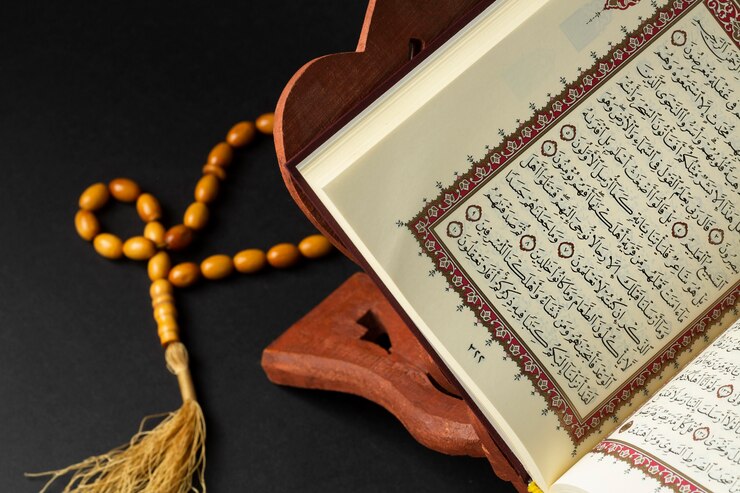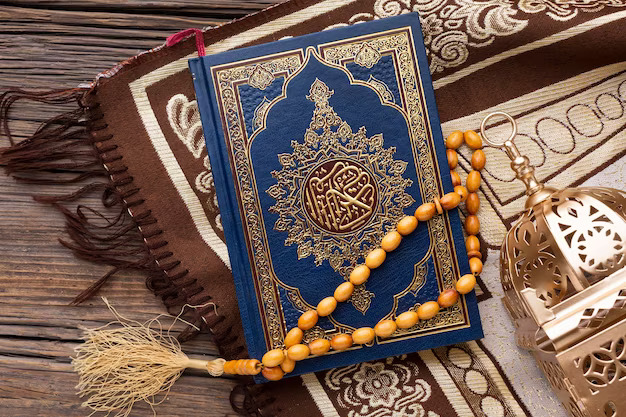Insights from the Quran, Hadith, and the Pious Predecessors
Introduction
In a world where our daily lives are often consumed by the hustle and bustle of the material realm, it’s easy to forget the spiritual essence that should guide us. The Quran, the holy book of Islam, serves as a timeless beacon of guidance for Muslims. In this blog post, we’ll explore the profound importance of the Quran in our daily lives, both here and in the hereafter. We will also draw inspiration from Quranic verses, Hadith (sayings of the Prophet Muhammad, peace be upon him), and the wisdom of the Akabreen (pious predecessors) as we delve into how they read and memorized the Quran.
The Quran as a Source of Guidance:
The Quran is not merely a book; it is a comprehensive guide for life. Allah (SWT) says in the Quran:
أَعُوذُ بِاللّٰهِ مِنَ الشَّيْطَانِ الرَّجِيمِ
بِسْمِ اللّٰهِ الرَّحْمٰنِ الرَّحِيْمِ
ذٰلِكَ الْكِتٰبُ لَا رَيْبَ ۛ فِيْهِ ۛ ھُدًى لِّلْمُتَّقِيْنَ
“This is the Book about which there is no doubt, a guidance for those conscious of Allah.” (Quran 2:2)

The Quran offers timeless wisdom and guidance for every aspect of life. It teaches us how to live justly, treat others with kindness, and connect with our Creator. In our daily lives, it serves as a moral compass, reminding us of our purpose and responsibilities.
The Quran and the Hereafter:
Our life in this world is temporary, but the consequences of our actions here have eternal implications. The Quran constantly reminds us of the Hereafter and the importance of living a righteous life. One profound verse states:
أَعُوذُ بِاللّٰهِ مِنَ الشَّيْطَانِ الرَّجِيمِ
بِسْمِ اللّٰهِ الرَّحْمٰنِ الرَّحِيْمِ
۞بَلۡ تُؤۡثِرُوۡنَ الۡحَيٰوةَ الدُّنۡيَا ۞ وَالۡاٰخِرَةُ خَيۡرٌ وَّ اَبۡقٰىؕ
“But you prefer the worldly life, While the Hereafter is better and more enduring.” (Quran 87:16-17)
This verse calls us to prioritize the Hereafter over the transient pleasures of this world. Remembering the Hereafter helps us maintain perspective and live a life that pleases Allah (SWT).
Memorizing the Quran:
One of the most profound ways to connect with the Quran is through memorization. The practice of memorizing the Quran, known as “Hifz,” has been a longstanding tradition in Islam. This memorization is not only a means of preserving the Quran but also a way to internalize its teachings.
The Prophet Muhammad (peace be upon him) said:
“The best of you are those who learn the Quran and teach it.” (Sahih al-Bukhari)
Memorizing the Quran is not an easy task, but it is immensely rewarding. It requires discipline, dedication, and consistency. Muslims, inspired by their love for Allah and His words, invest time and effort to commit the Quran to their hearts.
Quranic Inspiration from the Akabreen:
The Akabreen, or the pious predecessors, set exemplary standards for their relationship with the Quran. They understood its value and committed their lives to its teachings. Let’s reflect on a few of their quotes and experiences:
Imam Ibn Qayyim al-Jawziyya once said, “The Quran was revealed to be acted upon. Whoever acts upon it will be guided, and whoever leaves it will be misguided.”
Imam Shafi’i, one of the greatest jurists in Islamic history, memorized the Quran at a young age and dedicated his life to its study and implementation.
Imam Ahmad ibn Hanbal, known for his deep knowledge and piety, advised his students to recite the Quran daily and to ponder its meanings.
Conclusion:
The Quran is not a book that should collect dust on a shelf or be confined to the mosque. It is a guide that should be an integral part of our daily lives. Through its timeless teachings, we find solace, guidance, and a pathway to the Hereafter. By taking inspiration from


